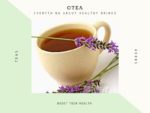Good quality sleep is so important. Yet many of us are just not getting enough of it, and this can be for many different reasons. For example, anxiety may cause insomnia (1) or you may have an uncomfortable mattress or pillow. If it is so, you can just buy a new mattress. And, of course, you can add to your routine the best teas for insomnia.
Whatever the individual causes, sleep deprivation will almost certainly harm well-being. It is said that 30% of people suffer from insomnia. Before take pills like Zolpidem (Ambien) or Suvorexant (Belsomra), read this article. What you may be surprised to learn is that some teas may help against this frustrating condition.
So here we are going to talk about 100% natural drinks that can help you with sleep disturbance. Please keep in mind that there are additional things you may add to strengthen teas effect. For example, it is on trend usage of manta sleep mask. This thing is really good for deeper sleep or CPAP machines.
Please note there are often conflicting messages about the impact of tea on sleeping ability, and what helps one person may not another. If you have some doubt, do not hesitate and consult your doctor at first. But with that said let’s take a closer look at some teas that may aid the body’s battle with insomnia. In addition to them, you may also try purchase insomnia remedies.
The Best Tea for Insomnia
Chamomile Tea for a Good Night’s Sleep
The flower Chamomile is regarded as a mild tranquillizer and sleep inducer, and many do seem to agree with its sleep-inducing qualities. The calming effects of the drink are perhaps down to an antioxidant called Apigenin, found in large quantities in this tea. Experts think that Apigenin may decrease anxiety and encourage sleep. Chamomile tea is one of the best tea for insomnia.
Lavender Tea
The flower lavender is a herb associated with having a soothing scent that could help promote sleep, and that is the same when in tea form. It has to be said there are limited results to show that lavender directly promotes sleep. However, it does have that relaxing aroma which, when released through a cup of tea, can help you unwind and then fall asleep.

Magnolia Bark as Insomnia Remedy
Magnolia tea is made mostly from the bark of a flowering plant but also consists of some dried buds and stems. It has been used in Chinese medicine for a very long time to alleviate symptoms including stress, abdominal discomfort, and nasal congestion.
Magnolia is also regarded worldwide for its sedative and anti-anxiety effects. The tea’s sedative effect is likely due to the compound honokiol, found in the flowers, stems, and bark of the magnolia plant. Honokiol is believed to work by modifying GABA receptors in the human brain, which may increase sleepiness. This seems one of the most promising teas to help with those struggling to sleep.
Passionflower to Calm Anxiety
Another flower that is used to help calm symptoms of anxiety and improve the state of sleep. A recent study of forty healthy adults found that participants who drank passionflower tea every day for 1 week reported considerably better sleep quality compared to those who did not drink it at all.
There are a lot of insomnia remedies on Amazon. Some of them are made on herbal base. Among these are Luna (sleep aid made of naturally sourced ingredients), Ashwagandha (for stress relief and anti-anxiety) and, Joy-Filled (100% plant-based supplement for anxiety & depression relief.) I personally didn’t try them, so I couldn’t recommend. What I suggest you to try is the best herbal teas only.
Valerian Tea to Help with Insomnia
Valerian is known as a very popular herbal sleep remedy in Europe and the USA. You can read Review Valerian Root in Treating Sleep Problems by National Institutes of Health. It is the Valerian root which is commonly dried and sold as tea. You can drink valerian tea before go to bed and in addition use that manta sleep mask or CPAP machine. Valerian tea is useful for sleeping but it can’t help with snoring.
Plenty of experts do believe that this root could be helpful for sleep when consumed, though they are not completely sure how it works. They do have the theory that it increases levels of a neurotransmitter called gamma-aminobutyric acid (shortly GABA), which when present in high levels it can increase sleepiness.
The right tea could be beneficial to people who need help sleeping. But unfortunately, tea is not a ‘one-stop fix’ that will get anyone to the land of the forty winks after a few sips. And more research needs to be done to learn the true benefits of these different types of tea, and the potential sleep-related help it could bring.
Drink natural teas before go to sleep and do not forget about additional sleep aids like CPAP cleaning machines or calming music. Use only the best teas for insomnia and only top-rated remedies. You can also use meditation for insomnia relief (2).
Music for Sleep and Meditation
After you drink you herbal tea, close your eyes, take 6-10 slow deep breaths, and start focusing on relaxing every inch of your body. Turn on the music and continue to take deep breaths. You will begin to feel relaxed in a few minutes as if you were floating. Your brain and body will be massaged into a deep sleep.


